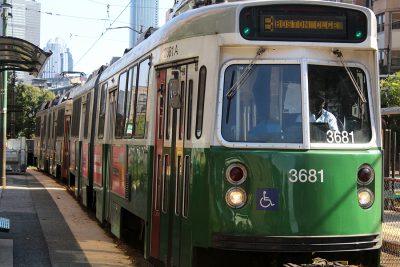After suffering financially during the pandemic due to lower ridership, the Massachusetts Bay Transportation Authority is looking at budget-reducing measures that include reduced and eliminated service.

These proposed budget cuts are an attempt to recover from an estimated budget deficit of anywhere between $308 million and $577 in the 2022 fiscal year, which starts next October.
The MBTA’s Fiscal and Management Control Board held a virtual board meeting Monday to discuss plans for fiscal years 2021 and 2022.
Officials proposed ending subway service at midnight and reducing its frequency, eliminating commuter rail service on weekends and after 9 p.m. on weekdays, and eliminating some “non-essential” bus routes.
The transit agency will return an in-depth, line-specific plan to the FMCB on Nov. 2. Then, a month-long public feedback period will begin before the final plan is announced on Dec. 7.
Staci Rubin, a senior attorney at the Conservation Law Foundation, said cutting the budget would hurt Boston communities.
“The MBTA’s proposed cuts are going to make it nearly impossible for people to get where they need to go,” Rubin said. “Before COVID-19, we were already witnessing a transportation crisis, but now that we’re in the middle of the public health pandemic, we’re about to experience a transportation catastrophe.”
Kristiana Lachiusa, community engagement coordinator at transit advocacy group LivableStreets Alliance, said the MBTA will likely implement rate hikes in 2021.
Gov. Charlie Baker signed a fare cap in 2016 that prohibits the MBTA from hiking fare prices more than 7 percent in a two-year period, Lachiusa said. Fares were last increased in 2019.
“The next legal time they are allowed to increase the fares is in 2021,” Lachiusa said. “Based on the current projected budget deficit, it is seeming very likely that they will be increasing the fares.”
She said these fare hikes could pose extra challenges for those who use the MBTA while commuting to work. Those who need to take the T, bus or commuter rail to get to work are the people who are still working in person, meaning they are already at higher risk of infection.
“The people who are most reliant on the MBTA right now are also most likely to get sick,” Lachiusa said. “So the increase in fares will just add yet another burden on people who’ve already been most impacted.”
The MBTA is at “a turning point,” Lachiusa added, and will require government help to meet the needs of its riders.
The agency had received funding from the Coronavirus Aid, Relief, and Economic Security Act, a federal stimulus package passed in March. But Rubin also said it’s time for the MBTA to seek government funds.
“We should look to the state legislature and also to the federal government,” Rubin said, “to figure out how much funding we need to provide meaningful and affordable public transit service.”




























































































































